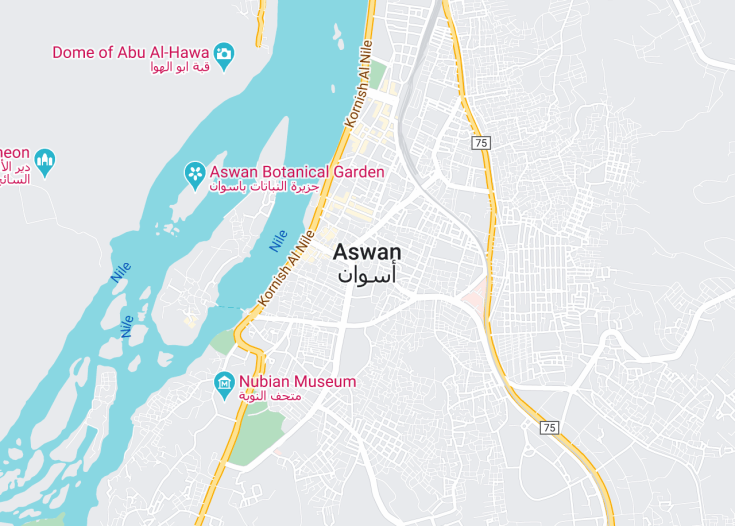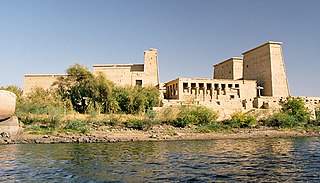Aswan, located in southern Egypt, is a serene Nile Valley frontier city with an allure that is steeped in the romance of ancient history. Known for its stunning riverine setting and vibrant Nubian culture, the city is also a base for excursions to the temples of Philae and Abu Simbel. Aswan offers a compelling mix of cultural richness, natural beauty, and archeological wonders, making it a captivating destination for travelers interested in exploring the legacies of ancient civilizations.
For a truly unique experience, plan a visit to Aswan during the cooler months from October to February when the weather is most pleasant.
Consider taking a felucca ride at sunset for a remarkable view of the Aswan landscape bathed in golden hues, providing a perfect photographic opportunity.
Top things to do & see in Aswan
Select the following sights and activities to discover best tickets and tours available in Aswan.
Aswan: Gateway to Ancient Wonders
| Country | Egypt |
| Time in Aswan | GMT+2 |
| Language spoken | Arabic |
| Population | 1.5 million (source: Egypt’s Central Agency for Public Mobilization and Statistics, 2023) |
| Currency | Egyptian Pound (EGP, £) |
| Airports |
|
Aswan, located in the southern part of Egypt, is a city steeped in antiquity and sophistication. Known for its serene Nile vistas and rich Pharaonic history, Aswan is also a vital modern hub in Egypt. The city is home to important archaeological sites, including the famous Philae temple complex, relocated during the construction of the Aswan Dam. Aswan is often seen as a starting point for river cruises, offering tourists a unique vantage point of ancient ruins and timeless landscapes. Beyond its monumental significance, Aswan is a vibrant city characterized by bazaars, mosques, and warm, welcoming locals. The climate is typically hot, mirroring the heat of the Nubian desert that stretches out beyond its boundaries. Modern Aswan is an amalgamation of historical depth and contemporary ease, making it a compelling destination for both scholars and travelers. Traditionally, Aswan was a strategic trade location and a garrison town for numerous armies throughout history due to its pivotal location near the Nile’s first cataract. Today, it balances tourism with its traditional pottery and textile industries, contributing significantly to Egypt’s economy.
Where is Aswan?
Perched on the east bank of the Nile in Southern Egypt, Aswan is surrounded by desert land and edged by water. It serves as a crucial link between Egypt and its southern neighbors.
Distances:
| Route | Distance by car | Time by car |
|---|---|---|
| Cairo to Aswan | 535 miles (861 km) | Approx. 8 hours |
| Luxor to Aswan | 138 miles (222 km) | Approx. 2.5 hours |
What is Aswan famous for?
Aswan is renowned for its historical sites like the Philae Temple Island and the impressive Aswan High Dam. It is also known for picturesque sailing on traditional feluccas along the lush Nile banks.
History
Aswan, one of Egypt’s oldest cities, has a history that dates back thousands of years, serving as both a strategic military site and a flourishing trade center.
Prehistoric to Pharaonic Times (Before 3100 BCE – 332 BCE)
Archaeological evidence suggests that the Aswan area was inhabited as early as the Paleolithic period. By the time of the ancient Egyptians, Aswan became a pivotal part of the civilization, primarily due to its location on the Nile and its access to invaluable resources, like granite, used in monuments all over Egypt. It was also the southern frontier of the Pharaonic Kingdom, guarding against Nubian invasions.
Ptolemaic and Roman Periods (332 BCE – 641 AD)
With the arrival of the Greeks and later the Romans, Aswan continued to thrive as a military and trade hub. Significant infrastructures, such as the famed Temple of Philae, were either built or enhanced during these periods. These new rulers integrated their own culture with the existing customs, which is evident from the hybrid architectural styles found in Aswan’s ancient ruins.
Islamic and Ottoman Era (641 AD – 1882 AD)
As Egypt became a part of the Islamic world, Aswan gained importance due to the spread of Islam into Africa. During the Ottoman era, Aswan served as a transit point for caravans traveling to and from the heart of Africa. The fortresses and bazaars of this era are a testimony to its continued economic significance.
British Colonial Period to Modern Day (1882 AD – Present)
The construction of the Aswan Low Dam in 1902 during the British occupation transformed the landscape and economy of Aswan, paving the way for the later construction of the High Dam in the 1960s. These developments boosted both the agricultural and tourism sectors significantly. Today, Aswan is a key cultural tourism destination in Egypt, noted for its enchanting scenery, historical sites, and vibrant cultural expressions.
Visit Aswan
What to see and do in Aswan
Aswan, a charming city on the Nile’s banks, offers a rich tapestry of history and culture. Key attractions include:
- The Temple of Philae, dedicated to the goddess Isis, showcasing magnificent ancient architecture.
- The Unfinished Obelisk, providing insight into stone-age engineering techniques.
- The Aswan High Dam, a marvel of modern engineering.
- A traditional felucca ride on the Nile for picturesque views of the sunset.
Immerse yourself in the local culture by visiting the vibrant markets or taking part in a Nubian cultural experience.
Festivals and Events in Aswan
Aswan hosts several vibrant events throughout the year:
- Abu Simbel Sun Festival: Occurs twice a year in February and October, celebrating the solar alignment on Ramses II’s temple.
- Aswan International Cultural Festival: Celebrates Nubian culture with music and dance every February.
These events offer unique experiences that capture the spirit of Aswan and its rich heritage.
Best time to visit Aswan
The ideal time to visit Aswan is during the cooler months from October to April, when the climate is more pleasant for exploring the outdoor historical sites and enjoying the scenic views along the Nile.
Is Aswan worth visiting?
Aswan is most certainly worth visiting for anyone interested in history, culture, and natural beauty. This city not only offers a deeply enriching historical insight with its ancient temples and monuments but also provides a serene escape with its beautiful Nile views and distinctive Nubian culture. Whether you’re an avid historian or a casual traveller looking for a unique experience, Aswan has something to captivate everyone.













